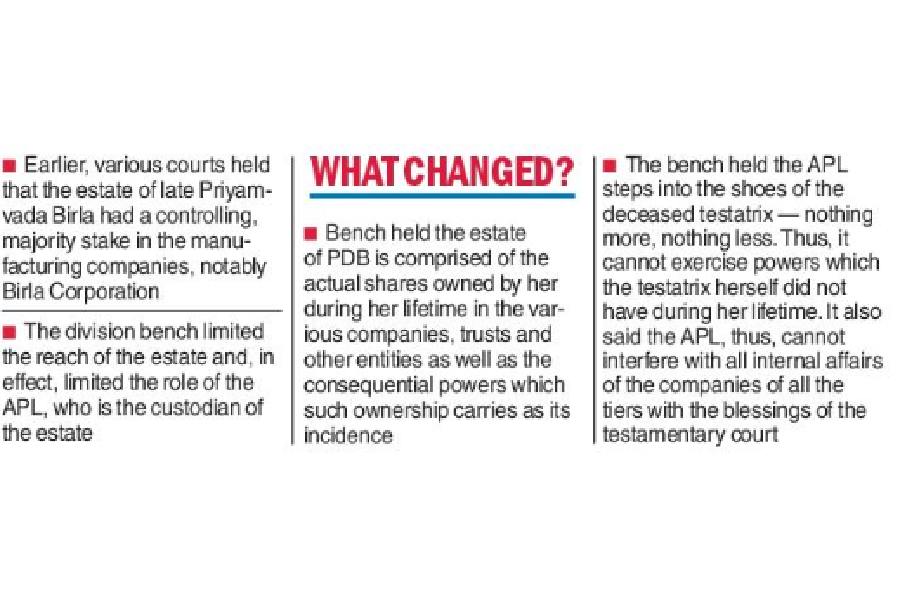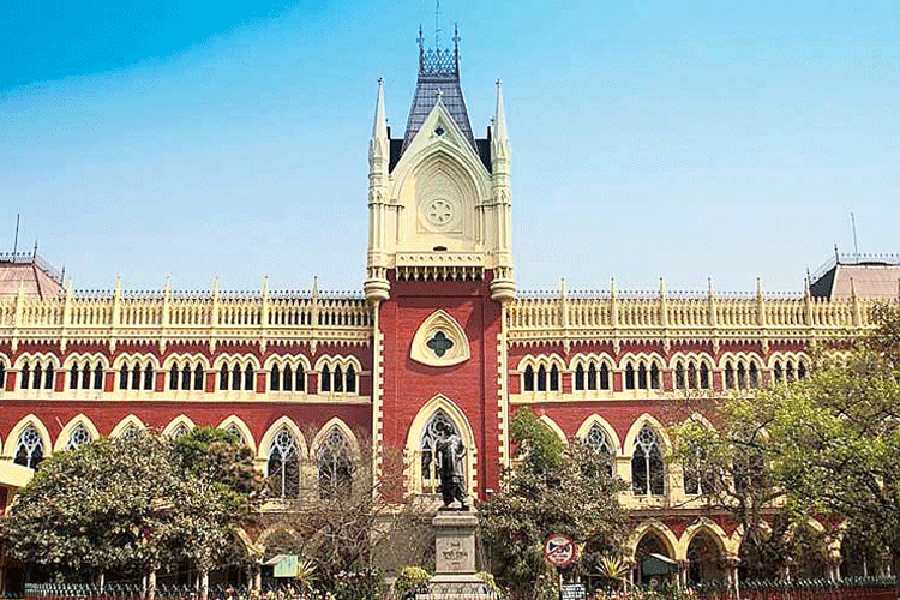Calcutta: A division bench of Calcutta High Court has redefined the estate of late Priyamvada Devi Birla and laid down operational guidelines for the committee of administrators managing the estate, prompting Harsh Vardhan Lodha to claim a major victory in the two-decade-long legal dispute with the Birla family over the ownership of the MP Birla empire.
The Lodha camp said the judgment, passed by Chief Justice T.S. Sivagnanam and Justice Sabyasachi Bhattacharyya of the high court, effectively removed any obstacle to Harsh Lodha’s continuance as the chairman, director and trustee of the MP Birla Group Companies, trusts and societies in all these entities.
It claimed that the verdict overturned the order handed down by a single bench of the court in 2020 which had ‘restrained’ Lodha from holding any position in the group.
The Birla camp is likely to move the Supreme Court to challenge the redefinition of the estate and the fetters placed on the administrator pendente lite (APL).

Despite the order passed by Justice Sahidullah Munshi in September 2020, Lodha had continued as chairman of the manufacturing companies within the MP Birla group — which clocked a market capitalisation of Rs 16,200 crore on Thursday — but lost control over various trusts and societies belonging to the group.
Justice Munshi’s order had prompted the Birla camp to file several contempt of court petitions against Lodha.
Debanjan Mandal, managing partner of Fox & Mandal and counsel for Lodha, said the judgment reaffirms his client’s faith in the judiciary as the final protector of civil rights. “The cloud of uncertainty created by the judgment of the trial court has been cleared by today’s (Thursday) verdict, paving the way for Lodha’s continuation as chairman, director and trustees of MP Birla Group,” Mandal said.
The Birla camp, however, claimed that the division bench judgment did not ‘modify’ the single bench order to the extent of reversing the ‘restraint’ on Lodha. They added that the chairman of the MP Birla group continued to remain in contempt of court.
“The order of the single judge restraining Harsh V. Lodha from holding any office in any entities in MP Birla Group has not been modified by the appeal court and the said restraint on Lodha continues,” N. G. Khaitan, senior partner of Khaitan & Co and counsel for the Birla family.
Redefining estate
Earlier, various courts held that the estate of late Priyamvada Birla had a controlling, majority stake in the manufacturing companies, notably Birla Corporation — the crown jewel of the MP Birla group. However, the division bench limited the reach of the estate and, in effect, limited the role of the APL, who is the custodian of the estate.
“The estate of PDB is comprised of the actual shares owned by her during her lifetime in the various companies, trusts and other entities as well as the consequential powers which such ownership carries as its incidence. Insofar as the companies are concerned, the estate left by PDB consists of the shares which she owned in the various companies and the powers and legal authority she had by virtue of such shareholding, which are heritable.
“Such powers include, for example, voting rights and ancillary other rights of shareholders sanctioned by law,” said the judgment, which runs into 300 pages.
The bench made a crucial observation that ‘controlling interest’ only means the heritable incidental rights, including voting rights, rights to participate in shareholders’ meetings and other decision-making processes which PDB would have by dint of her shareholdings in the respective companies.
“Her personal charisma or influence among the different companies and their managements, even if existent during her lifetime, unfortunately, went with her and cannot form a bundle of heritable rights to be part of her estate,” the judgment added.
The Lodha camp pointed out that PDB held majority shareholding in five investment companies in the group, but not in any of the five operating companies (including the four listed entities) of the group. In effect, these five investment companies hold a little over a 14 per cent stake in Birla Corp.
APL committee
While the committee was appointed in 2012, the controversy erupted in 2019 when it asked investment and operating companies to vote against the re-appointment of Lodha in operating companies. The single bench accepted the reach of the APL in 2020.
The division bench dealt with two issues: how far the APL can interfere in company affairs, and whether the APL decisions have to be unanimous or can a majority view prevail.
“The APL steps into the shoes of the deceased testatrix — nothing more, nothing less. Thus, it cannot exercise powers which the testatrix herself did not have during her lifetime,” the judgment read.
“The APL, thus, cannot interfere with all internal affairs of the companies of all the tiers with the blessings of the testamentary court,” it added.
The division bench also ruled that the APL would be led by the majority, an argument preferred by the Birlas. “In case there is no resolution, the third member shall exercise veto power,” the bench said, adding that in case of major decisions, it has to seek direction from the probate court.











